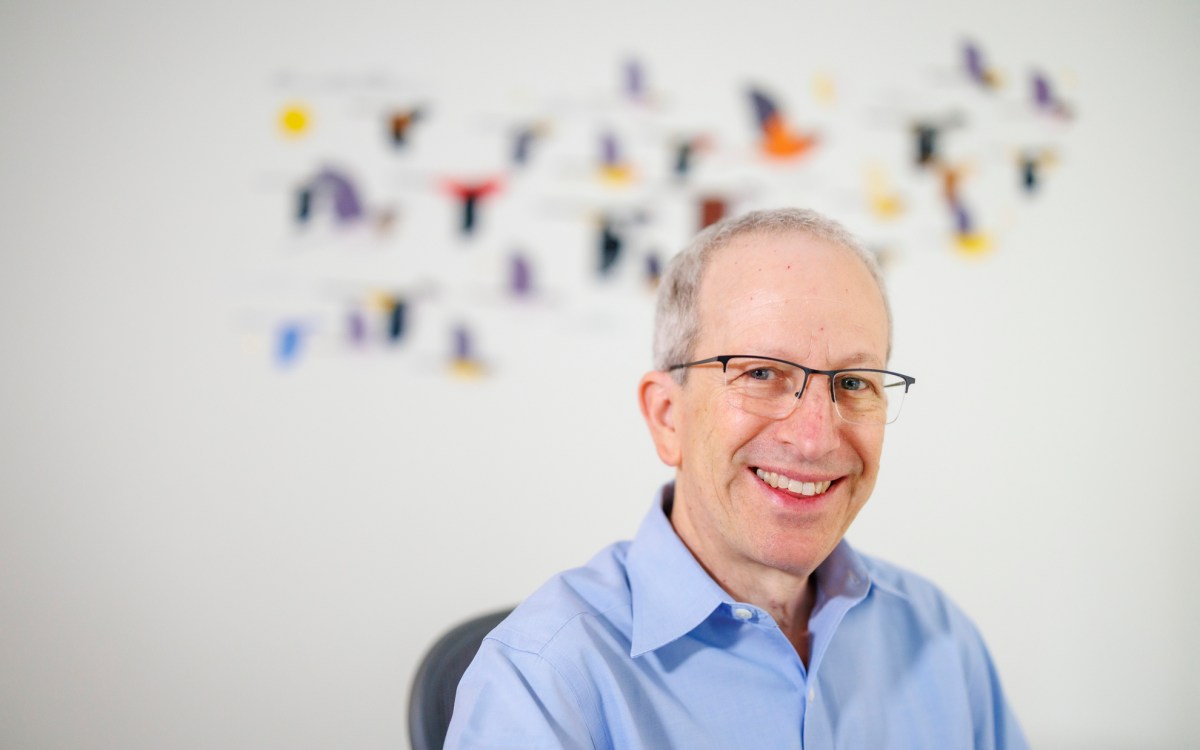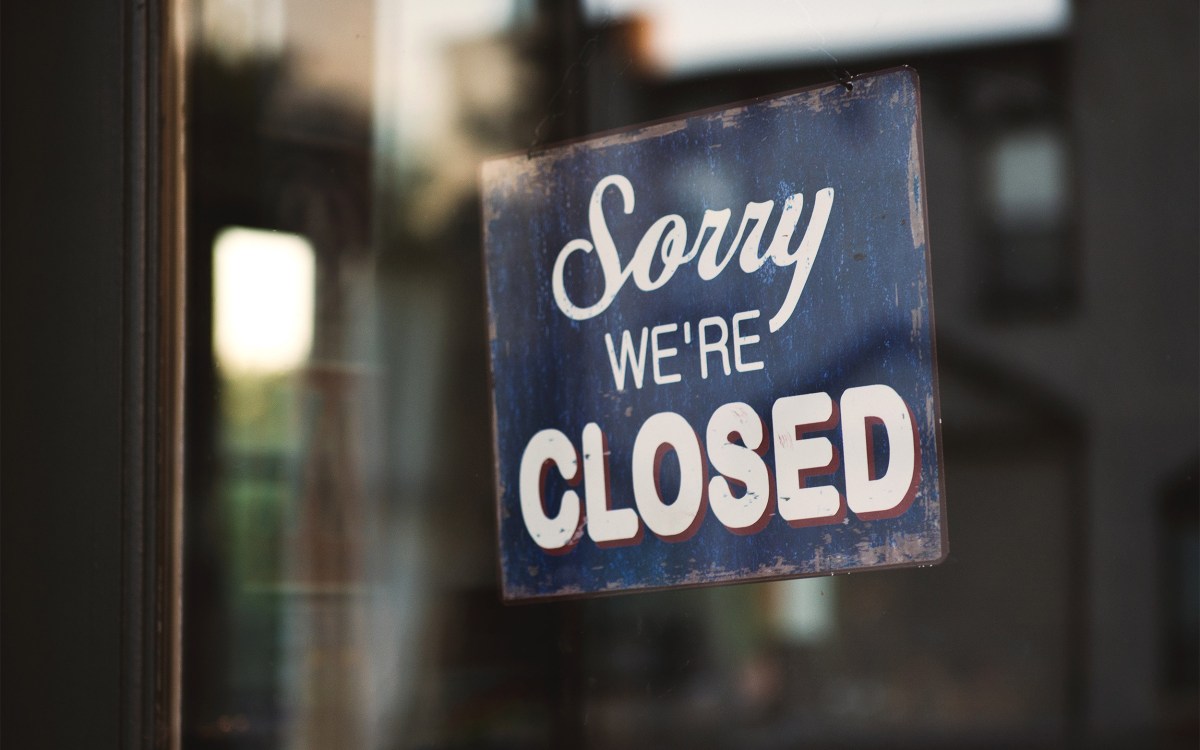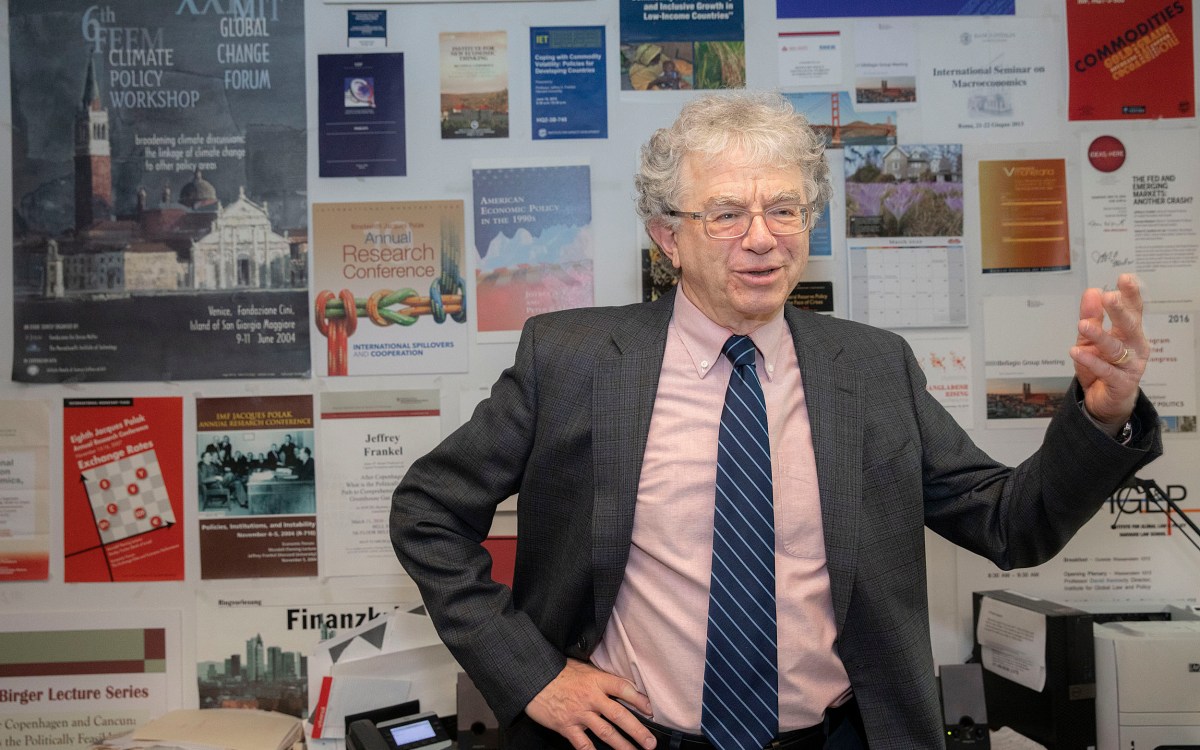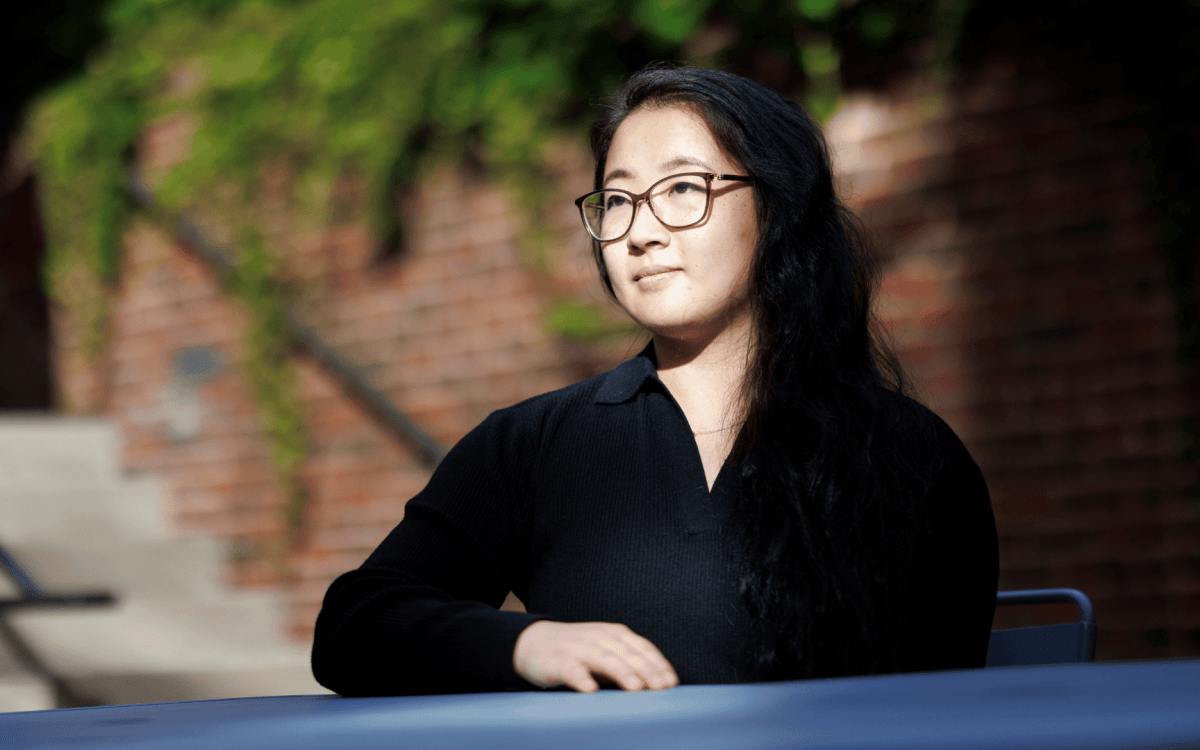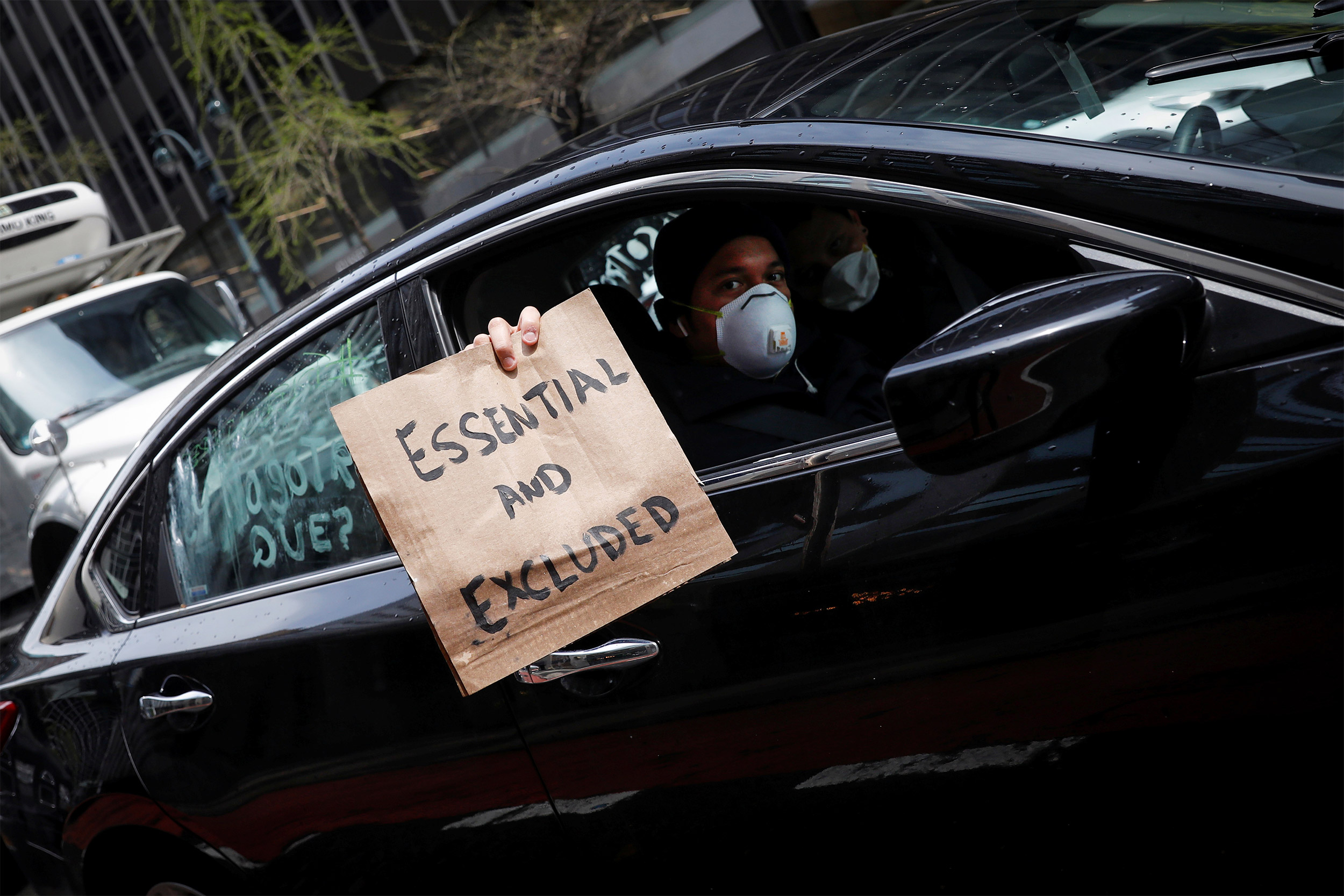
A worker holds a sign during a protest for the rights of essential immigrant workers in New York state.
Reuters/Mike Segar
Democratizing work for the people and the planet
Professor Julie Battilana and international collaborators lead the charge in rethinking how we work
This is part of our Coronavirus Update series in which Harvard specialists in epidemiology, infectious disease, economics, politics, and other disciplines offer insights into what the latest developments in the COVID-19 outbreak may bring.
With COVID-19 ravaging economies, Harvard Professor Julie Battilana, and colleagues around the globe, issued an urgent plea: We need to transform the way we work.
Battilana, who studies how organizations can implement positive change, knew that we can do better when it comes to work. She and her collaborators called for improvements in three dimensions: by democratizing companies, decommodifying work, and creating sustainable policies that benefit the environment.
Battilana; Isabelle Ferreras, Catholic University of Louvain, Belgium, and Harvard Law School’s Labor and Worklife Program; and Dominique Méda, Paris Dauphine University, France, penned an op-ed that was cosigned by more than 5,000 researchers from universities around the globe — including nearly 40 associated with Harvard University. It was published this past weekend in more than 40 newspapers in 36 countries and generated a website and hashtag: #democratizingwork.
Raising women’s voices in conversations about work was an important aim. Battilana, Ferreras, and Méda joined forces with five more female scholars: Julia Cagé, Paris Institute of Political Studies, France; Liza Herzog, University of Groningen, the Netherlands; Pavlina Tcherneva, Bard College; Hélène Landemore, Yale University; and Sara Lafuente Hernandez, University of Brussels, Belgium. This core group — which represented fields including sociology, philosophy, management, economics, and political science — mobilized their networks to get thousands of others to cosign, starting with women in academia.
Battilana is the Alan L. Gleitsman Professor of Social Innovation at Harvard Kennedy School (HKS) and the Joseph C. Wilson Professor of Business Administration at the Harvard Business School — as well as the founder and faculty chair of the Kennedy School’s Social Innovation + Change Initiative.
We spoke with Battilana about the op-ed and the mission to transform work.
Q&A
Julie Battilana
HKS: What prompted you to write an op-ed about democratizing work?
Battilana: What prompted us to write this op-ed is the crisis, which is not only a health crisis. The COVID-19 pandemic has highlighted profound cracks and vulnerabilities in our social fabric, in our economy, and in our politics.
We are confronted with massive social inequalities: in wealth, in access to health care and a healthy home, between who gets to work from home and who are the essential workers, risking their safety for others. These inequalities existed long before the coronavirus, but they are magnified and amplified today.
“As we emerge from this crisis, we will have to invest capital to support workers and citizens. But this will not be enough. We will also need to change the laws and our culture.”
Julie Battilana
The pandemic has also temporarily brought the economy to a halt and has demonstrated how the environment responds when we pollute less. But as we prepare to restart the economy, we must learn from this crisis and prioritize protecting the environment. Otherwise, we will continue to destroy the planet.
Altogether, the crisis magnifies the need to change. The societal and economic status quo before the coronavirus was untenable. As we rebuild post-COVID-19, we must invest in more resilient, equitable, healthy, just, and green societies. Doing so requires new ways of working and organizing that will set us on a path to a more democratic and sustainable future. The purpose of this op-ed is to highlight options to build this kind of future, but these options are not the only ones that should be considered — far from it. I view the op-ed as a call to collectively engage in a debate so that we can redesign our system together.
HKS: When you circulated the op-ed in the academic community, you received an overwhelming response from scholars who wanted to co-sign. Why do you think the manifesto resonated so intensely?
Battilana: I study the politics of change. And a crucial finding from my research is that agitation — merely saying that things don’t work — is not enough. We saw this with Occupy Wall Street, which very effectively agitated against the status quo, but didn’t move much beyond agitation. To really effect change, we must also innovate and orchestrate the change.
Back in 2008, the world, including the academic community, brought attention to problems within the system. And yet, we still await fundamental reforms. This time, I think academics, like many other citizens, want to make sure we are doing everything to ensure that sustainable change comes from this crisis. I think that this is why so many scholars signed the op-ed. They want to move beyond agitation and participate in both innovation and orchestration.
We have seen that change is possible from how we have massively reorganized society to respond to the pandemic. And we are not starting from scratch: over the past decades, countries across the globe have developed ways of working and organizing that are more democratic and sustainable. The academic community can contribute to efforts to redesign our system by sharing what we have learned from our research and by collaborating with civil society organizations, governments and businesses who are involved in the broader movement for change.
In the op-ed, we proposed innovations — alternative social and economic models we can adopt to face the future. The solutions that we discussed are not the only ones, but our hope is that the op-ed will contribute to a real debate about solutions in different contexts. It would be foolish to think that what works in one context can work across all.
HKS: You’ve published this manifesto in outlets all over the world. In what ways are the issues you address universal? Are some countries doing a better job than others in approaching the future of work?
Battilana: This crisis is a global one. And it reflects how interconnected our economies and societies have become. And so yes, this is a universal issue. And yet, not all countries will (or should) respond the same way. However, we have hope when we see, for instance, that South Korea’s government has committed to a Green New Deal to launch the post-COVID-19 economic recovery.
New legal arrangements suited to organizations that pursue social and environmental objectives alongside financial ones, are becoming available around the world, including in the United Kingdom, France, Italy, South Korea, and the United States.
When it comes to workers’ participation in strategic decision making in corporations, Germany and some Nordic countries have laws that provide workers formal representation on supervisory boards, giving them a voice in the management of the company. Isabelle Ferreras, who drafted the op-ed with me and Dominique Méda, is affiliated with the Labor and Worklife Program at Harvard Law School, which has published an agenda to bolster worker representation and worker power within companies and beyond.
And some heads of state, including the New Zealand Prime Minister Jacinda Ardern and Finnish Prime Minister Sana Marin, have proposed to integrate well-being as a key indicator of success and a priority for their governments. They are actively working towards boosting their citizens’ well-being. These country-level policies are critical to face the wave of unemployment and to support gig workers, the informal economy and the most vulnerable citizens.
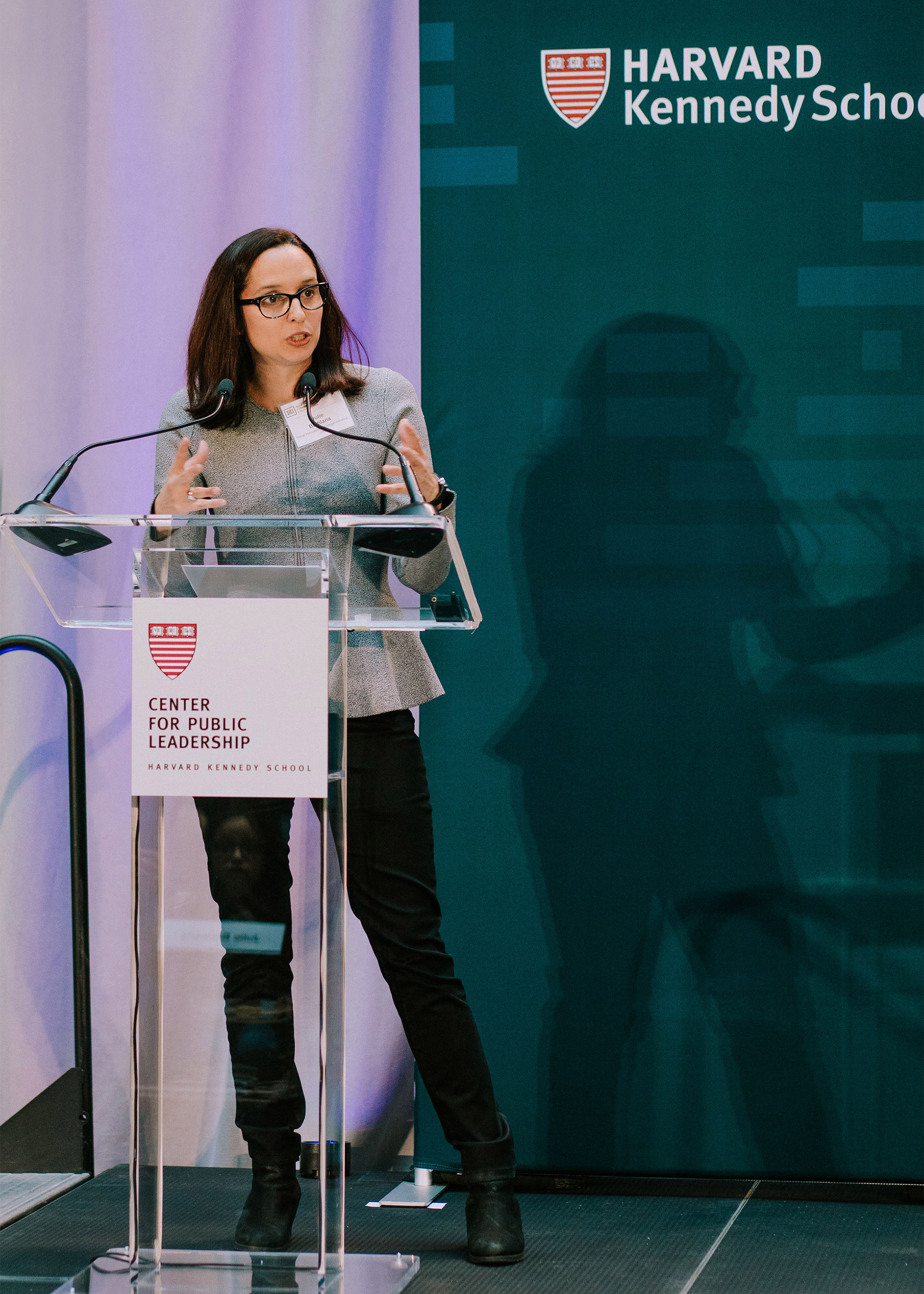
HKS: What are the challenges to democracitizing and decommodifying work, while fostering environmental recovery?
Battilana: Our economy and our society are still primarily driven by the pursuit of profit maximization. What is at stake is a major economic and societal change that will require great effort, determination, and creativity. And, this is easier said than done. As we emerge from this crisis, we will have to invest capital to support workers and citizens. But this will not be enough. We will also need to change the laws and our culture.
In terms of the economy, we have to ensure that we don’t merely pick up where we left off but develop new systems for employee participation and set clear goals for employee well-being, and environmental and social metrics, alongside financial performance. In my research, I find that even those with the best intentions often struggle as they lose sight of their environmental and social goals in their quest for efficiency.
But my research also points to a silver lining: Organizations that are more democratic fare better. This is why we are looking towards workers and citizens for answers. We have done research that proves that this is not only a viable path, but it may be a necessary one.
HKS: And where do we begin to make these changes?
Battilana: This is the critical question! I am currently writing a book on power. A key component for understanding power is understanding the hierarchies that shape who has power and who doesn’t. We are up against a mighty hierarchy that still puts capital investors at the top, and workers — investors in labor — at the bottom. In the book, my co-author Tiziana Casciaro and I show that we cannot challenge power hierarchies alone. Change requires that we, as citizens, change our habits, that companies change their practices and that governments change their laws. Such changes require collective movements. We hope the op-ed serves as a catalyst for collective action.
Social psychology research indicates that once individuals take a public stance on an issue, they are more likely to act in accordance with that issue. This op-ed has two missions. The first was to mobilize the academic community around the need to democratize firms, decommodify work, and remediate the environment — and to get scholars to take a stance publicly. The second one was to reach out to citizens, governments, businesses, not-for-profits, and social enterprises that want to make this shift. Together we may start orchestrating changes that will help democratize and decommodify work and restore the planet.
